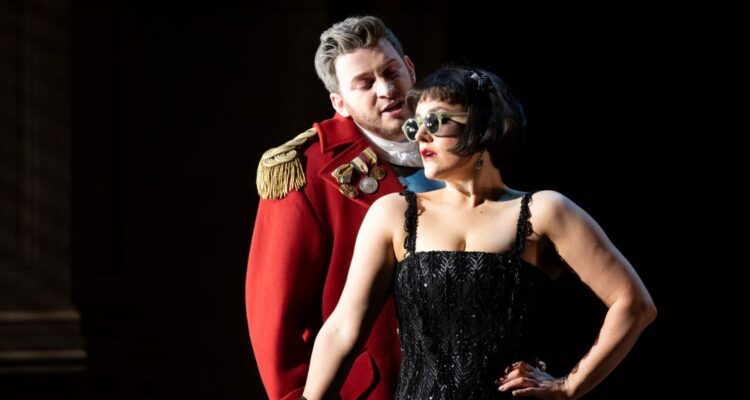While there is plenty of competition for the accolade, it is reasonable to suggest that ‘Giulio Cesare in Egitto/Julius Caesar in Egypt’ (1724) is Handel’s finest, best sustained, operatic achievement. He certainly prized it highly, given that he spent an unusually long six months on its composition, and also went to the trouble of having the score published. One superlative number unfurls after another, teeming with melodic invention, deep psychological insight and deft orchestration only enhanced by broad scope for the improvisation and acting skills of each performer. This is Baroque Opera at its finest, where all the apparently dry conventions of the form melt away taking you through the ‘da capo’ disguise into the melting heart of every matter.
David McVicar’s famous production debuted in 2005 and has had several iterations since. When I first saw it I was uneasy at the slipperiness of setting, combining as it does the British Empire in Egypt, Bollywood, and even the arch camp of ‘Carry on Cleo’. But on coming back to it after a long interval I think this lavish generosity of inspiration is actually exactly the protean framework this opera of many moods needs to succeed. What is so wondrous about the work is the range of its reach from the depths of nihilistic despair through to the frothiest of frivolity, and this production is flexible and capacious enough to embrace the full gamut.
There is a great deal of action, but not much plot. We encounter Caesar victorious in Egypt, as its co-rulers, Ptolemy and Cleopatra, develop different strategies for managing the Roman invader. Ptolemy tries to ingratiate himself by sending the head of Caesar’s defeated opponent. Pompey, much to Caesar’s distaste; whereas Cleopatra aims to win over Caesar by seduction in the guise of Lidia, a distressed lady of the court. Cornelia and Sesto, widow and young son of Pompey, vow vengeance on Ptolemy and his sidekick Achilla, but end up as the prisoners of both, who form rivalrous designs on them. Eventually the schemes of Ptolemy and Achilla are defeated, all masks removed, and Caesar and Cleopatra are united.
The story is exquisitely framed in a set of receding proscenium arches with a sparkling artificial sea in the far distance, all reminiscent of the historical stage machinery in the surviving jewel of a Baroque theatre at Český Krumlov.A variety of drapes and shuttered interiors allow us to distinguish different sections of the royal palace, and a series of delectably tropical lighting schemes convey both a sense of African sun and the search to evade its rays. Inventive and demanding choreography distinguishes every scene; and all the main characters participate underlining the significance of the action. This is occasionally distracting, but for the most part highly telling as a reinforcement of the overall emotional meaning.
The cast was uniformly fine. In the title role Aryeh Nussbaum Cohen had the right natural authority, and was at his very best in the arias of military swagger and self-assertion. Equally impressive in his way was Cameron Shahbazi as his chief opponent, Tolomeo, bristling with bravura brio, and every inch the spiteful, capricious teenager; while also recognisably capable of the same seductive charm as his sister. As his general, Achilla, Luca Tittoto provided the contrasting bass ballast to the higher-pitched voices, and Ray Chenez took his moments as the fey, duplicitous courtier, Nireno.
But, for me, the three stand-out performances came from Louise Alder, Svetlina Stoyanovac and Beth Taylor. The success of this opera depends on a Cleopatra who can deliver her ‘infinite variety’, as Danielle De Niese did back in 2005. Alder’s version has, perhaps, less artful show, but as much if not more nuance of mood, quite apart from being abreast of the formidable technical demands. Beth Taylor finds real depth of feeling and dignity in the role of Cornelia with more feisty pushback than usual; and Stoyanovac is just stunning as Sesto, with a purity of tone and precision of attack that marks her out as a Handelian to watch. Her rendition of ‘Cara Speme’ was heard by the audience in a unique moment of silent concentration.
I had a few cavils. Some of the tempi in the first half seemed inordinately slow, especially in the sequence of arias of lament and planned revenge for Cornaila and Sesto. Moreover, within these almost monolithic statements of grief the absence of forward pulse was filled by a violence towards Cornelia as a prisoner that seemed gratuitous. The contribution of the Orchestra of the Age of Enlightenment under the experienced baton of Laurence Cumming was outstanding in both ensemble and virtuoso display, though the natural horn player in ‘Va tacito’ had something of an off night, as sometimes happens with such brilliant-toned, but unpredictable, instruments.
These points do not seriously detract from a deeply absorbing revision of a production that is now the benchmark for this opera just as the Hockney/Cox version became for ‘The Rake’s Progress.’ There are few pleasures greater than to sit on afterwards as the twilight draws a muslin veil over the Glyndebourne gardens and ruminate with a companion over an evening as stimulating and richly satisfying as this.
George Frideric Handel
Libretto by Nicola Francesco Haym after Giacomo Francesco Bussani’s Giulio
Cesare in Egitto
Director: David McVicar
Conductor: Laurence Cummings
Cast: Louise Alder, Ray Chenez, Aryeh Nussbaum Cohen, Cameron Shahbazi, Svetlina Stoyanovac, Beth Taylor, Luca Tittoto
Until 23 August 2024
5 hrs 30 mins with dining interval

